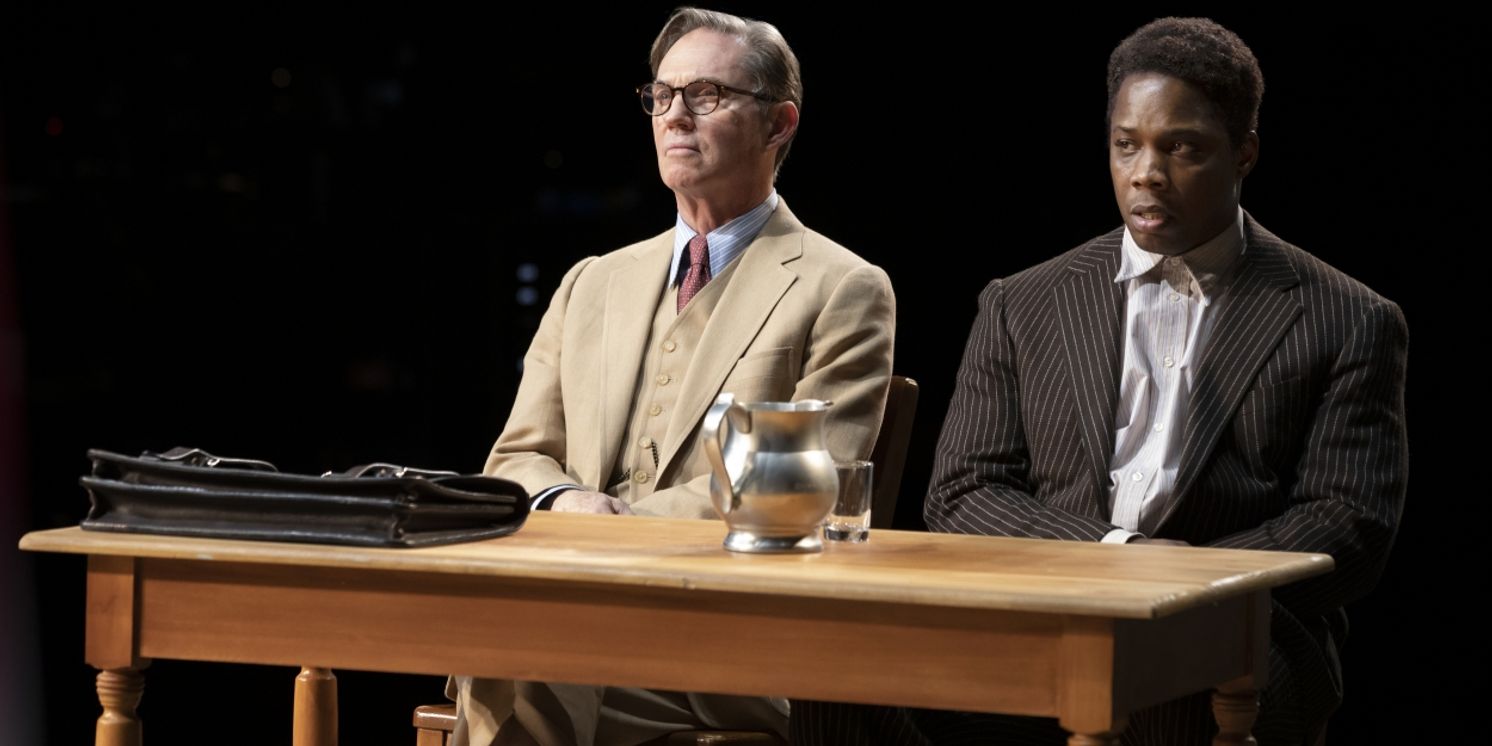Review: HARPER LEE'S TO KILL A MOCKINGBIRD at Golden Gate Theatre
A work of art and a must-see production, now through Oct. 9

Spoiler alert: Not much has changed in this country since Harper Lee wrote To Kill a Mockingbird in 1960. Lee's semi-autobiographical and beloved novel takes place in 1930s Alabama, a time of deep racial prejudice and injustice. (Sound familiar?) When she put pen to paper and wrote the story of Atticus Finch, the small-town lawyer who defends a black man named Tom Robinson accused of raping a white woman, she couldn't know then that the racial animosity that consumed the South she grew up in would still be present today.
Part thought-provoking homage and searing indictment of the current state of union, Aaron Sorkin's To Kill a Mockingbird is an extraordinarily brilliant (and at times humorous) work of art that Harper Lee devotees should unhesitatingly love. I know I did.
The question that most assuredly came up for original producer Scott Rudin and playwright Aaron Sorkin had to be the advisability of taking on the much-loved coming-of-age tale as told by Atticus' adoring young daughter and protagonist Scout, and transferring it to the stage. Then there was the 1962 film starring Gregory Peck in his Academy award-winning portrayal of Atticus Finch to contend with. The screenplay by Horton Foote had successfully made the transition to film. Could it make the same leap to the Broadway stage in the 21st century? With this great distance in time, Mockingbird seemed untouchable.
And in fact, Sorkin is on record saying that his first draft reflected the anxiety he felt in adding to or changing the canonical text. He knew he risked being run out of town - or worst yet, being panned by Broadway critics. But he went back to the drawing board and in revisions, his Mockingbird found a way forward that painstakingly preserved the signature imprint of the book, while putting his own indelible imprimatur on the work.
In a key change, Sorkin shifted the protagonist role from young Scout Finch (Melanie Moore is a standout) to her father, Atticus Finch. Now she and her older brother Jem (Justin Mark), and a visiting boy named Dill Harris (Steven Lee Johnson) would narrate the story and subsequent trial of Tom Robinson (Yaegel T. Welch's moving portrayal brings tears) and the trial would now take center stage. In a striking theatrical sleight-of-hand, the children are played by adults. Scout and the two boys are kids moving from innocence to adulthood, as well as adults looking back on that summer of abject racism.
Richard Thomas puts in a wonderfully nuanced performance as the genteel, small-town southern lawyer caught between the unspoken Southern code of upholding white honor, privilege and patriarchy and his lawyer's oath to defend his client.
But even as he is defending Tom Robinson in Judge Taylor's court (Richard Poe) from the lies of Mayella Ewell (Arianna Gayle Stucki) and her father, Bob Ewell (Joey Collins is superb as the poor and bitter Ewell). Atticus seeks to keep the peace by repeatedly excusing the rampant racism in his neighbors as blind spots, readily attributing their hatred to underlying factors.
He is the "good, white moderate," an apologist who sees upsetting the status quo as anathema to his value system. In one of the most famous quotes from the book, movie and this play, Atticus seeks to explain to his children why they must be patient with the racism of the people of Maycomb. "You never really understand a person," he tells them, "until you consider things from his point of view... until you climb in his skin and walk around in it."
Jem recoils at his father's reluctance, as does the family's longtime black maid, Calpurnia or "Cal" (Jacqueline Williams in a stellar portrayal). When she finally speaks up, he responds by saying "I believe in being respectful," to which she replies: "No matter who you disrespect by doing it." Cal continues to express her anger, especially when Atticus says that he doesn't want his children "hating people they disagree with." She quotes him back to himself. "You've got to give Maycomb time, Cal. This is the Deep South. You got to give Maycomb time. Well, how much time would Maycomb like?" Atticus doesn't yet see that in the name of racial harmony he's upholding the status quo and hurting Cal. It won't be until Tom Robinson is found guilty that Atticus finds his voice.
Three years after the release of Harper Lee's novel, Rev. Dr. Martin Luther King Jr. was arrested on April 12, 1963 in Birmingham, Alabama - just a three-hour drive from Harper Lee's childhood home in Monroeville, Alabama, which was the inspiration for Maycomb.
In a smuggled-in newspaper, King read a statement by eight white Alabama clergymen questioning his methods and asking him to slow down, to wait. He responded in part by saying, "Perhaps it is easy for those who have never felt the stinging darts of segregation to say, 'Wait.'" King then spoke of his grave disappointment in the "white moderate, who is more devoted to 'order' than to justice...who paternalistically believes he can set the timetable for another man's freedom....," adding that "lukewarm acceptance is much more bewildering than outright rejection."
It seems to be the premise and hope of Sorkin's Mockingbird that we won't have to wait another 60+ years for justice to be served. All Rise.
Harper Lee'S To Kill a Mockingbird
Now thru October 9, 2022
BroadwaySF.com; Golden Gate Theatre
Written by Aaron Sorkin
Directed by Bartlett Sher
Scenic Design by Miriam Buether
Costume Design by Ann Roth
Lighting Design by Jennifer Tipton
Sound Design by Scott Leher
Original music by Adam Cuettel
Photo courtesy of Julieta Cervantes
Reader Reviews

Powered by
|
Videos

